Elixir programming language evaluation for IoT
Geovane Fedrecheski
Laisa Costa
Marcelo Zuffo
School of Engineering
University of São Paulo


Introduction
The Internet

The Internet of Things

The Swarm at the edge of the cloud
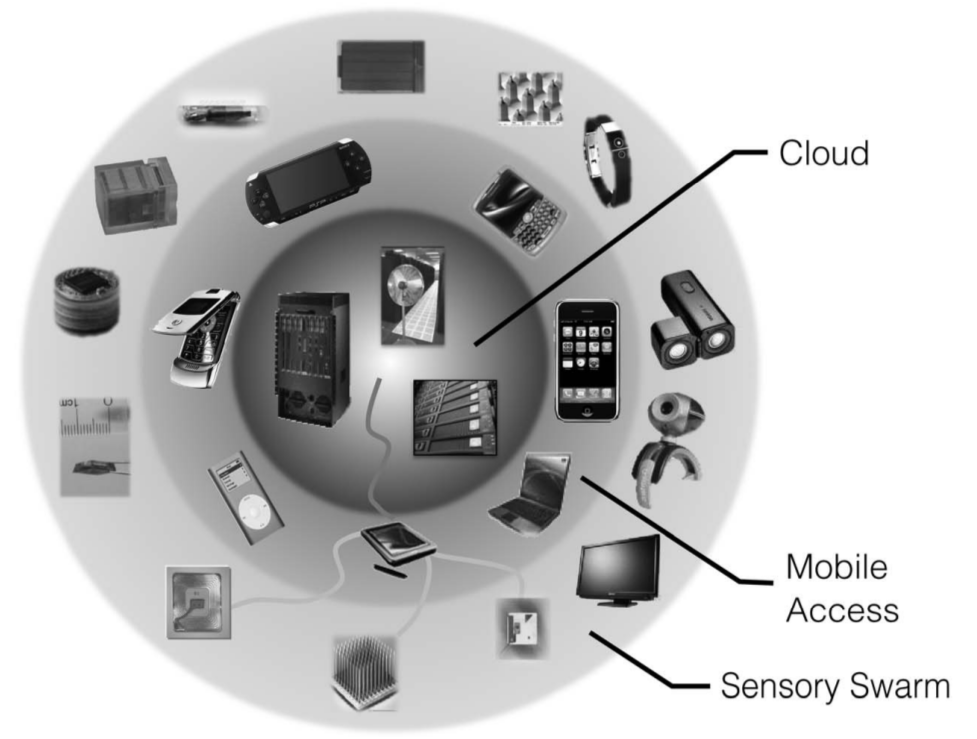
Edward Lee, Jan Rabey. et al. "The Swarm at the Edge of the Cloud", 2014
Main challenges
- Resource constrained
- Power efficiency
- Communication unreliability
- Context sensitivity
- Remote management
- Concurrency
Popular languages for IoT
- C
- C++
- Java
- Javascript
- Python
Erlang
context

Created in the Telecommunication industry



...

~1980

Erlang
requirements

- Concurrency
- Soft real-time
- Distribution
- Hardware Interaction
- Large Software Systems
- Complex Functionality
- Continuous Operation
- Quality Requirements
- Fault Tolerance






Erlang
nowadays





HTTP


Functional
Concurreny
Fault tolerance
Data structures
Consistent libs
Modern tooling



Elixir
~2011
Elixir
Goals

-
Extensibility
-
Productivity
-
Compatibility
Elixir
Erlang

Industry


Nerves Framework
Method



Swarm Broker
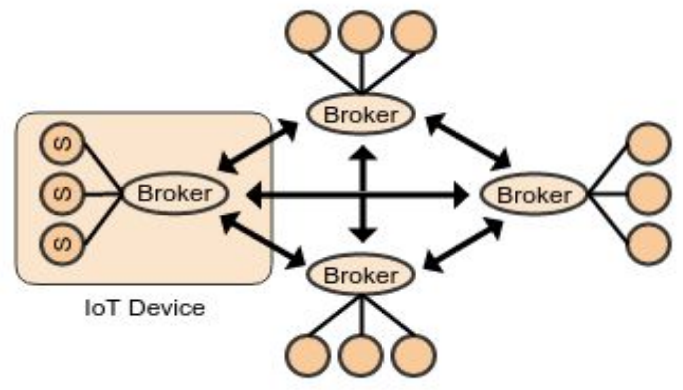
Swarm Broker

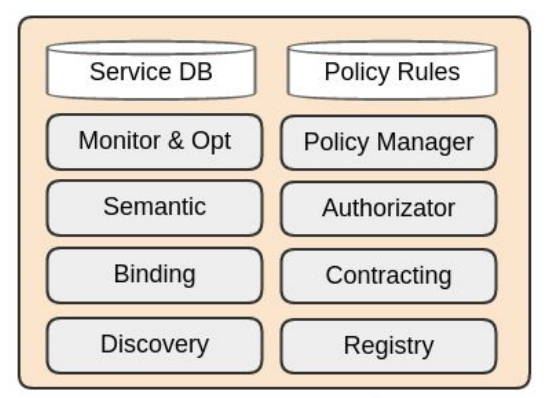
Authorizator
YES

consumer
producer
http://localhost:4000/broker/authorizator
NO
200
401
GET
Comparison



Comparison
Lines of Code
CPU
Memory
Requests / sec.


Platform
Quad-core computer (x86)
6GB of RAM
Java 1.8
Erlang 18.2
Elixir 1.2
Load test tool: Tsung 1.6

Results
Lines of Code

Elixir
Java
551
176



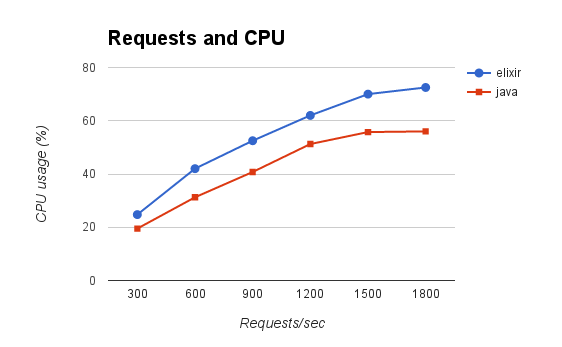
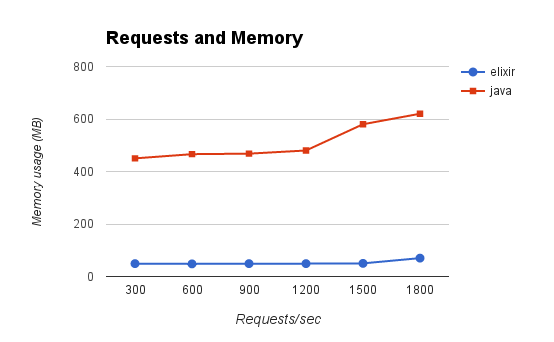
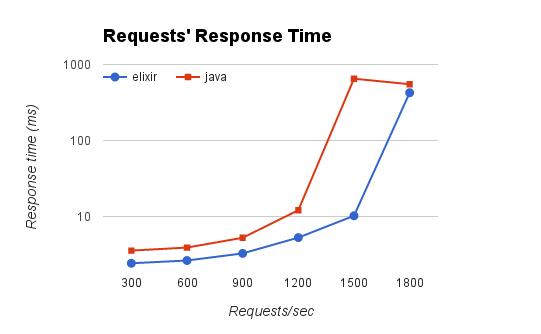






Lines of Code |
||
|---|---|---|
CPU |
||
Memory |
||
Requests / sec. |
Discussion
- Elixir used more CPU, but had more requests per second
- Elixir has good potential to run IoT/Swarm micro-services
Next steps
- Test in embedded platforms
- Explore persistent connections (e.g websockets)
- Explore reliability and fault-tolerance
Obrigado
Thanks
Geovane Fedrecheski
Laisa Costa
Marcelo Zuffo
School of Engineering
University of São Paulo


School of Engineering
University of São Paulo


Contents
- The Internet of Things
- Functional Programming
- Elixir
- IoT + Elixir: 4 Case Studies
Functionaλ Programming
f(g(x), h(...))

Steve Vinoski, IEEE Computing Society 2009
"... ironically, the resurgence of interest in FP languages owes a lot to Java’s popularity."
"Another reason [...] is the move toward multicore architectures."
"... developers look for the opportunity to
get more done with less."
Welcome to the Functional Web
Functional Programming Languages





Lisp

Elm

Elixir

José Valim

Core committer
Unsatisfied with thread-based concurrency
~2010

Unsatisfied with thread-based concurrency

Repetitive strain
injury




by Bruce A. Tate
So what's interesting about
this Erlang thing?
What even an "Erlang" is?
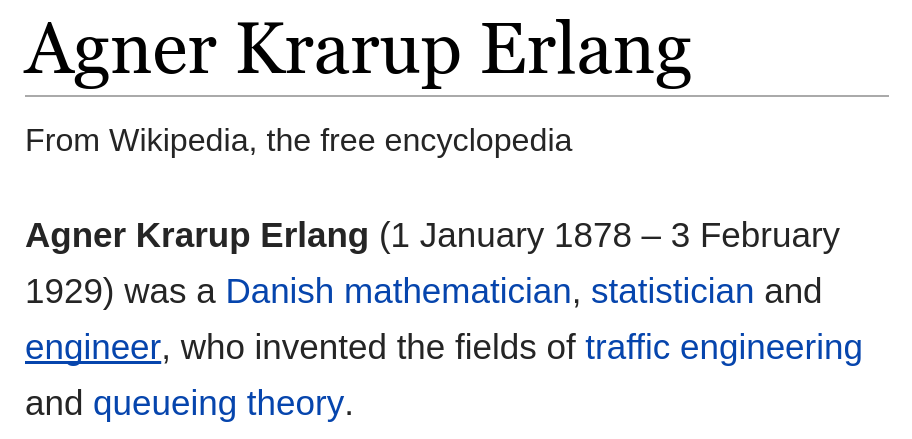

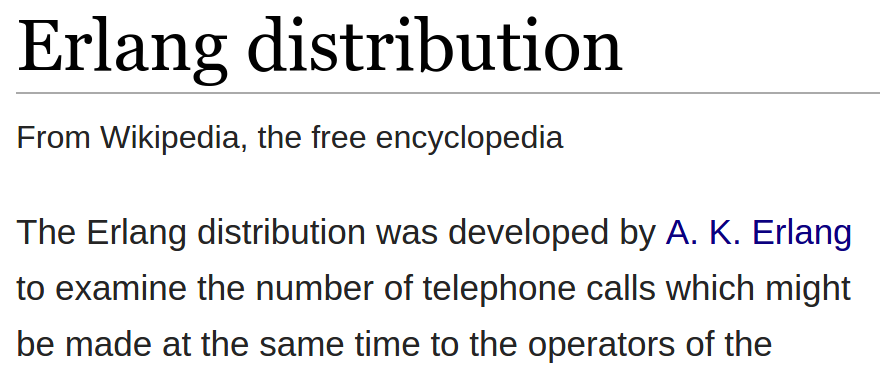

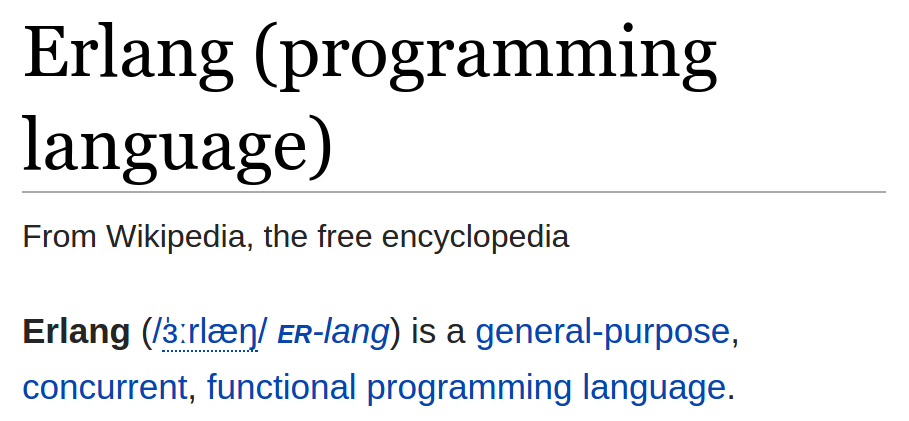

A bit of History


Cases




I loved everything that Erlang had
but I hated everything that it didn't had
- José Valim
Features


Pattern Matching

> {method, path} = {:get, "temp"}
{:get, "temp"}
> method
:get
> path
"temp"
b = :binary.encode_unsigned(258)
# b has value <<1, 2>>
<<x, 2>> = b
# x has value 1
i = :binary.decode_unsigned(<<x, 2>>)
# i has value 258request = {:get, "temp"}
case request do
{:post, path, payload} ->
send_resp 200
{:get, path} ->
send_resp 200, "{'value':17.5, 'unit': 'celsius'}"
enddefmodule Math do
def fib(0), do: 0
def fib(1), do: 1
def fib(n), do: fib(n-1) + fib(n-2)
end
Math.fib(8) # => 21Anonymous Functions

> add = fn(a, b) -> a + b end
#Function<12.71889879/2 in :erl_eval.expr/5>
> add.(1, 2)
3> Enum.map([17.9, 20.2, 18.4], fn(x) -> x * 2 end)
[35.8, 40.4, 36.8]Can be passed as parameters
Processes

spawn
A lightweight thread of execution
(The key Erlang/Elixir abstraction)

How is this different from threads?
-
No shared memory
-
VM Processes
Do not share memory
Communicate via
Message Passing
message
VM Processes
Excuse me, have you ever heard of (VM) processes?

Erlang VM
Scheduler
Sched.
Sched.
Sched.
OS Processes
OS Threads
VM Processes

OS
pid = spawn(fn ->
:timer.sleep(3000)
IO.puts "hi"
end)fn ..
spawn
self()
sleep
puts
A lightweight thread of execution
Messages
pid = spawn(...)
send(pid, "hello")receive do
msg ->
IO.puts msg
endfn ..
spawn
self()
receive
send


Node.spawn(
:"app@computer-2",
fn -> Hello.world end)
send
receive
app@computer-1
app@computer-2
Distributed
Same syntax

We have:
-
Isolated Processes
-
Message passing
-
Distribution
We want:
-
Fault Tolerance

dangling processes!

spawn
spawn

call the supervisor
supervisor
worker
worker
worker

worker
Supervision Tree
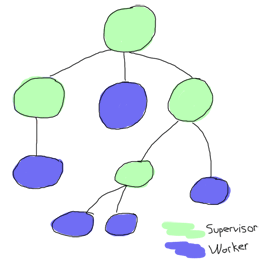
import Supervisor.Spec children = [ worker(Cache, []), supervisor(DatabaseSupervisor, []), supervisor(TCPSupervisor, [4040]) ] Supervisor.start_link(children, strategy: :one_for_one)
Applications
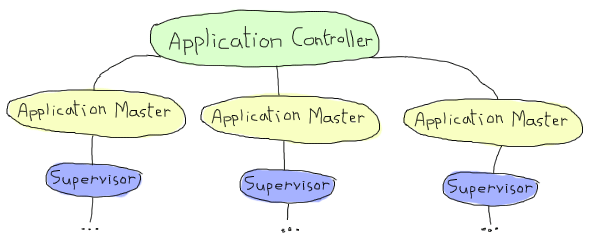
your app
http
server
logger

app@computer-1
Distributed Applications


app@computer-2

Fault Tolerance


Open Telecom Platform
-
Supervisor
-
Application
-
GenServer
-
GenEvent
OOP
Objects
Elixir
Processes


Production-ready?

Making the IoT
Functional with Elixir:
Four scenarios
-
Easy CoAP binary parser
-
Fault-tolerant microservices
-
Elixir and Java load test
-
Automatic deployment of Elixir images
CoAP
-
Constrained Application Protocol
kind of a "smaller HTTP, for IoT"
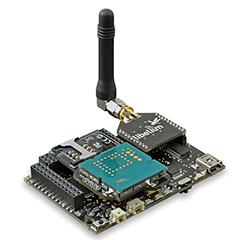

request
response
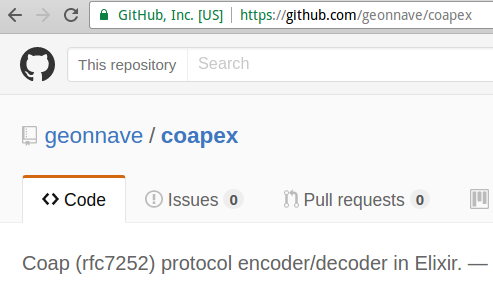
CoAP - Codes
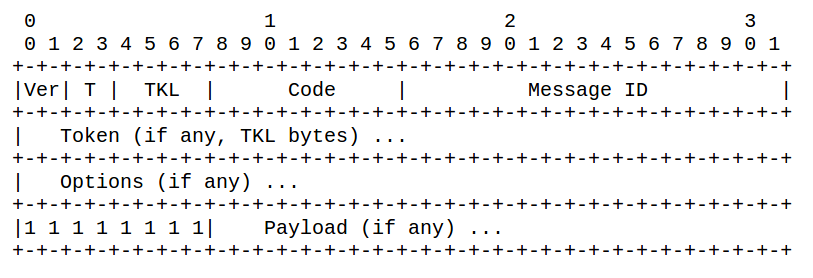
(binary header)
0.01 (GET) (Request)
0.02 (POST) (Request)
2.05 (Content) (Response)
4.04 (Not Found) (Response)
000.00001
000.00010
010.00101
100.00100
CoAP
parser

1
0
0
0.01
123
01000000 00000001 0000000001111011 11111111
255
64 1 0 123 255
(empty)
(empty)
(empty)
%Message(type: :con,
code: :get,
msg_id: 123,
options: [])int coap_parseHeader(coap_header_t *hdr,
const uint8_t *buf,
size_t buflen)
{
if (buflen < 4)
return COAP_ERR_HEADER_TOO_SHORT;
hdr->ver = (buf[0] & 0xC0) >> 6;
if (hdr->ver != 1)
return COAP_ERR_VERSION_NOT_1;
hdr->t = (buf[0] & 0x30) >> 4;
hdr->tkl = buf[0] & 0x0F;
hdr->code = buf[1];
hdr->id[0] = buf[2];
hdr->id[1] = buf[3];
return 0;
}https://github.com/1248/microcoap/blob/master/coap.c
C
def decode(<<1::2, type::2, token_len::4,
code_class::3, code_detail::5,
msg_id::16,
token::binary-size(token_len),
rest::binary>>) do


def decode(<<1::2, type::2, token_len::4,
code_class::3, code_detail::5,
msg_id::16,
token::binary-size(token_len),
rest::binary>>) do
code = decode_code(code_class, code_detail)
token = decode_token(token, token_len)
{options, payload} =
decode_options_and_payload(rest)
%Message{
version: 1,
type: Registry.from(:types, type),
code: code,
msg_id: msg_id, token: token,
options: options, payload: payload
}
endint coap_parseHeader(coap_header_t *hdr,
const uint8_t *buf,
size_t buflen)
{
if (buflen < 4)
return COAP_ERR_HEADER_TOO_SHORT;
hdr->ver = (buf[0] & 0xC0) >> 6;
if (hdr->ver != 1)
return COAP_ERR_VERSION_NOT_1;
hdr->t = (buf[0] & 0x30) >> 4;
hdr->tkl = buf[0] & 0x0F;
hdr->code = buf[1];
hdr->id[0] = buf[2];
hdr->id[1] = buf[3];
return 0;
}Microservices

Source: http://martinfowler.com/articles/microservices.html
Microservices features
Source: http://martinfowler.com/articles/microservices.html
Services as components
Organized as business capabilites
Smart endpoints and dumb pipes
Decentralized Governance
Decentralized Data Management
Infrastructure Automation
Design for failure
Evolutionary Design
Microservices
"... my primary guideline would be:
don't even consider microservices unless you have a system that's too complex to manage as a monolith
Martin Fowler, MicroservicePremium, May 2015

The Swarm at the edge of the cloud

Elixir in times of microservices*
-
Processes as nanoservices
Processes packaged in Applications
-
Fault-tolerant processes
Process supervisors
Distributed Erlang
*http://blog.plataformatec.com.br/2015/06/elixir-in-times-of-microservices/
Elixir in the embedded world


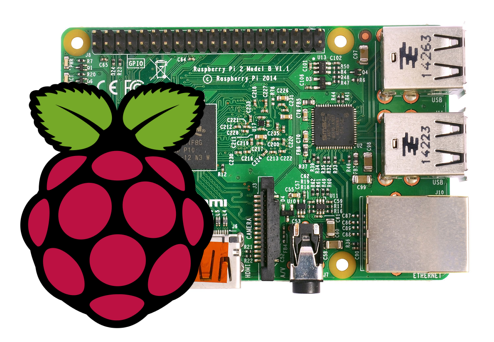
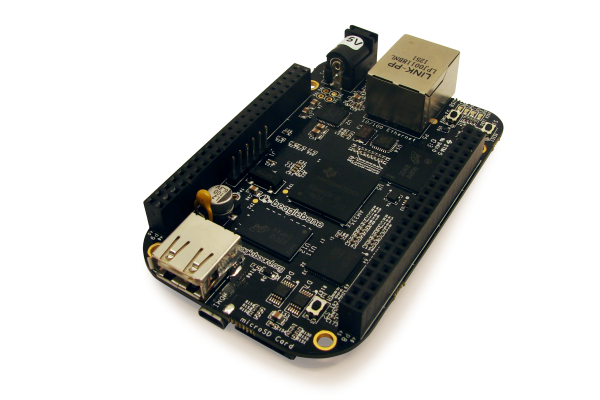

Raspberry Pi
Beaglebone Black

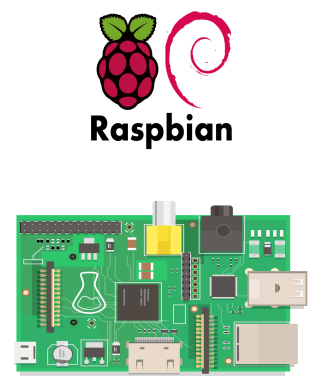
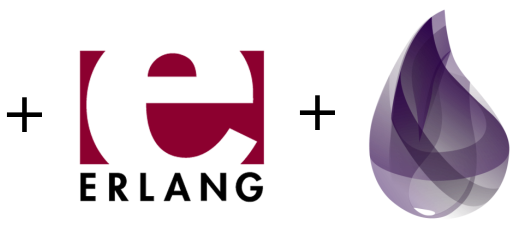
sudo vi /etc/apt/sources.list
# install erlang stuff...
# clone elixir
make && make install
But..
-
Repeat the process for each board?
Maybe write a script
What if want to use another board? (will need a different setup)
Nerves
Craft and deploy bulletproof embedded software in Elixir



Based on
Buildroot is a simple, efficient and easy-to-use tool to generate embedded Linux systems through cross-compilation.
Code
Package
Run
Prepare


VM
ARM
Toolchain

=
+
+
|>





{
,

}

=

Code
Package
Run
Prepare
$ mix nerves.new hello_nerves --target rpi3 $ cd hello_nerves $ mix deps.get $ mix compile
(write your project in Elixir)
$ mix firmware $ mix firmware.burn
$ NERVES_TARGET=bbb mix firmware



FOTA (Firmware Over the Air) Upgrades!
$ http POST "192.168.0.121:8988/firmware" \
content-type:application/x-firmware \
x-reboot:true < firmware.fw


Run


How does it compare?




Image sizes

Nerves

Raspbian
~300MB
~20MB
Boot time

Nerves

Raspbian
~30 sec.
~3 sec.
Multiple Boards

Nerves

Raspbian


All drivers included

Nerves

Raspbian


For more Information

Appendix
:observer.start
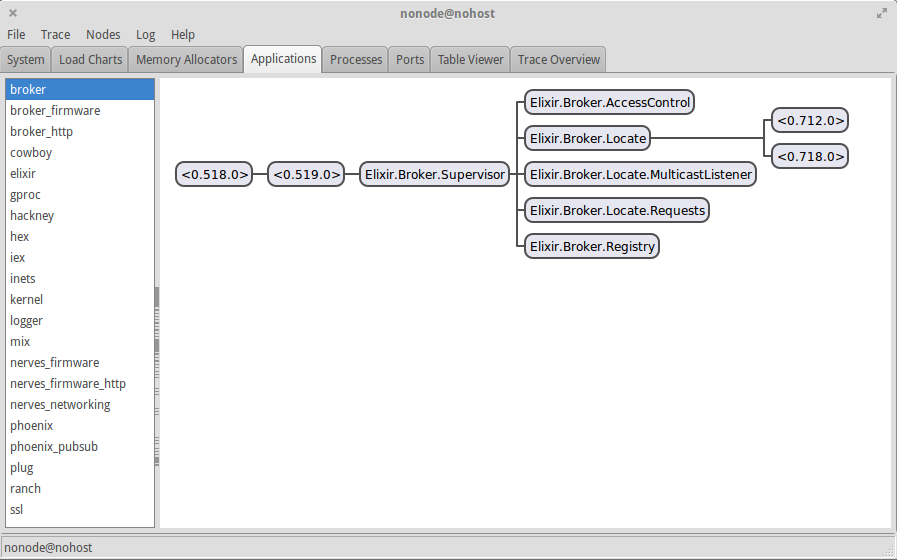
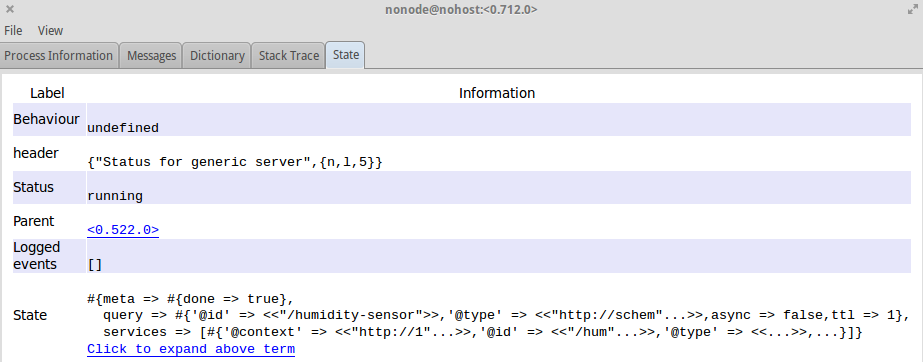
(slide intentionally left blank)
(this is the appendix!)
IoT Architectures and Implementations





Industry case



Code
Compiler
Erlang
VM
(other OS processes)

OS

defmodule Math do
# this is a comment.
# below is a function
def sum(a, b) do
a + b
end
end# pattern matching is like method
# overloading on steroids!
defmodule Math do
def zero?(0) do
true
end
def zero?(x) when is_integer(x) do
false
end
end{a, b, c} = {:hello, "world", 42}
a # has value :hello
b # "world"
c # 42b = :binary.encode_unsigned(258)
# b has value <<1, 2>>
<<x, 2>> = b
# x has value 1
i = :binary.decode_unsigned(<<x, 2>>)
# i has value 258Elixir
Some Drips

my = self() #PID<0.141.0>
pid = spawn(fn ->
:timer.sleep(3000)
send(my, {:get, "temp"})
end)
receive do # will block for 3 secs!
{:post, path} ->
IO.puts "was a post on path '#{path}'"
{:get, path} ->
IO.puts "was a get on path '#{path}'"
endPattern Matching

> x = 1
1
> 1 = x
1
> 2 = x
** (MatchError)x = 1
The "match operator"
Assignment

match values
AND
bind values to variables
Code
Package
Run
Prepare





ISCE 2016 - Elixir programming language evaluation for IoT
By Geovane Fedrecheski
ISCE 2016 - Elixir programming language evaluation for IoT
- 887



